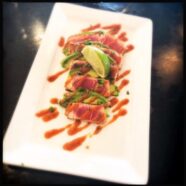Tags
- Award winning food critic
- beaufort restaurant reviews
- beaufort travel writer
- beaufort writer
- Best Charleston food critic
- Best food critic in the South
- Best food writer Charleston
- Best food writer South Carolina
- Best freelance food writer Charleston
- Best freelance food writer South Carolina
- Best freelance travel writer Charleston
- Best freelance travel writer South Carolina
- best freelance writer beaufort
- Best freelance writer Charleston
- Best Restaurant review North Charleston
- Best restaurant reviews Charleston
- Best restaurant reviews Hilton Head
- Best restaurant reviews in the South
- Best restaurant reviews Mount Pleasant
- Best restaurant reviews Myrtle Beach
- Best restaurant reviews South Carolina
- Best restaurant reviews Summerville
- Best Southern food critic
- Best travel writer Charleston
- Best travel writer South Carolina
- best writer beaufort
- Charleston culinary writer
- Charleston restaurant expert
- Charleston restaurant writer
- Charleston-based food writer
- Charleston-based freelance writer
- Charleston-based travel writer
- Charleston-based writer
- Food critic
- Food critic Charleston
- Food critic Georgia
- Food critic South Carolina
- Food writer
- Food writer Beaufort
- Food writer Charleston
- Food writer Hilton Head
- Food writer Myrtle Beach
- Food writer South Carolina
- Freelance food critic Charleston
- Freelance food photographer
- freelance food writer
- freelance food writer beaufort
- Freelance food writer Charleston
- Freelance food writer Georgia
- Freelance food writer Low Country
- Freelance food writer South Carolina
- Freelance humor writer Charleston
- Freelance humor writer South Carolina
- Freelance restaurant critic Charleston
- freelance travel writer
- freelance travel writer beaufort
- Freelance travel writer Charleston
- Freelance travel writer South Carolina
- freelance writer Beaufort
- Freelance writer Charleston
- Freelance writer comedy
- Freelance writer Hilton Head
- Freelance writer satire
- Freelance writer South Carolina
- humorous freelance writer
- JuJu Mount Pleasant
- JuJu Mount Pleasant review
- Low Country food writer
- Low Country writer
- Maui Restuarant reviews
- Restaurant critic Beaufort
- Restaurant expert Charleston
- restaurant expert South Carolina
- Restaurant review Charleston
- Restaurant review South Carolina
- Restaurant reviews South Carolina
- Satirical Freelance Writer
- South Carolina food writer
- South Carolina travel writer
- Souther restaurant critic
- Southern food critic
- Southern food writer
- travel expert Charleston
- travel expert South Carolina
- travel writer Charleston
- Travel writer Myrtle Beach
- travel writer South Carolina
- Vanessa Wolf
- Vanessa Wolf Charleston
- Vanessa Wolf Charleston City Paper
- Vanessa Wolf comedy writer
- Vanessa Wolf creative non-fiction
- Vanessa Wolf critic
- Vanessa Wolf fiction
- Vanessa Wolf fiction writer
- Vanessa Wolf food critic
- Vanessa Wolf food reviewer
- Vanessa Wolf food writer
- Vanessa Wolf food writer Low Country
- Vanessa Wolf freelance Hilton Head
- Vanessa Wolf freelance writer
- Vanessa Wolf freelance writer Charleston
- Vanessa Wolf freelance writer Myrtle Beach
- Vanessa Wolf freelance writer South
- Vanessa Wolf funny writer
- Vanessa Wolf humor
- Vanessa Wolf restaurant critic
- Vanessa Wolf restaurant reviewer
- Vanessa Wolf restaurant reviews
- Vanessa Wolf reviews
- Vanessa Wolf satirical writer
- Vanessa Wolf satirist
- Vanessa Wolf South Carolina
- Vanessa Wolf writer
- Vanessa Wolf writer Hawaii
- Vanessa Wolf writer Low Country
- Vanessa Wolf writer Maui
- Wolf food writer
- Wolf writer
- Wolf writer Charleston
Related Posts
- Jackrabbit Filly has a long future ahead of it in Park Circle – Charleston City Paper
- Dashi’s irreverent mashup of cuisines is at once weird and wonderful (Charleston City Paper)
- House-made sausages and burgers are good bets at Butcher & The Boar (Charleston City Paper)
- New Grove Street bistro Herd Provisions serves quality ingredients prepared with care (Charleston City Paper)
Share This
With more focus on authentic Caribbean offerings, strip mall refuge JuJu could be the next locals hangout (Charleston City Paper)
Posted on Sep 5, 2018 | 0 comments
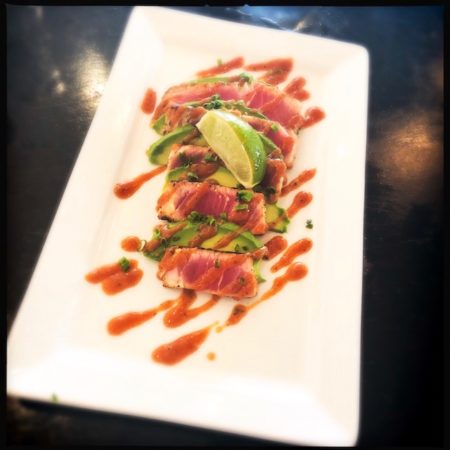 Despite its residency in the relatively depressing Moultrie Plaza strip mall on Coleman Boulevard, JuJu is a sleek and stylish space. Presumably named for the West African spiritual practice, the sign declares the cuisine to be “Urban American Caribbean Fusion.” Considering Caribbean cuisine spans 26 countries and represents a mix of African, European, Latin American, and East Indian cultures, not to mention Creole, Cajun, Chinese, and Native American influences, the broad-reaching description justifies the serving of, well, pretty much anything.
Despite its residency in the relatively depressing Moultrie Plaza strip mall on Coleman Boulevard, JuJu is a sleek and stylish space. Presumably named for the West African spiritual practice, the sign declares the cuisine to be “Urban American Caribbean Fusion.” Considering Caribbean cuisine spans 26 countries and represents a mix of African, European, Latin American, and East Indian cultures, not to mention Creole, Cajun, Chinese, and Native American influences, the broad-reaching description justifies the serving of, well, pretty much anything.And so it goes. Case in point, the West Indian ahi ($12), which finds five thin, red slices of yellowfin plated with fresh avocado. The edges of the lightly seared tuna are coated with a spicy dry rub and slathered, unfortunately, with a dark orange ‘guava drizzle.’ The overly sweet coulis is the dish’s downfall, and the punchier ingredients of the region — pungent garlic, bright citrus, or sharp ginger — would provide a welcome flavor boost.
Conch fritters ($9) are generally associated with the Bahamas, and JuJu’s don’t disappoint. The seven round, fried croquettes are soft and doughy, filled with bits of white onion, plus red and green bell peppers. The conch itself isn’t visible, but the chewy texture comes through. Seasoned with cumin and served with a smoked pepper aioli, it’s one of the more authentic appetizers available, standing out among ‘fusion’ offerings like cheddar cheese and slaw-topped pork sliders ($9) or deviled eggs adorned with fried oysters ($11), the current It Girl of bar menus across the Lowcountry.
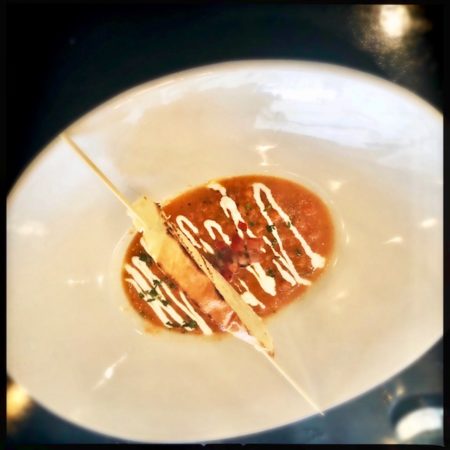 When it comes to soup, Caribbean cuisine ranges from earthy green Jamaican pepper pot to sunny yellow Trinidadian squash and corn, but JuJu eschews all that in favor of Gazpacho Olé. A variation on the Spanish classic, the blended raw veggie soup pops with the flavors of fresh tomato, cucumber, and bell pepper, plus raw garlic and piquant wine vinegar. Chunkier and much redder than the traditional almond and olive oil-infused Andalusian standard, this interpretation highlights the vegetables. While the plating is comically pretentious — a single, thin, skewered slice of baguette balances precariously over the soup like an edible tightrope act — the cool dish is still a welcome treat on a warm summer evening.
When it comes to soup, Caribbean cuisine ranges from earthy green Jamaican pepper pot to sunny yellow Trinidadian squash and corn, but JuJu eschews all that in favor of Gazpacho Olé. A variation on the Spanish classic, the blended raw veggie soup pops with the flavors of fresh tomato, cucumber, and bell pepper, plus raw garlic and piquant wine vinegar. Chunkier and much redder than the traditional almond and olive oil-infused Andalusian standard, this interpretation highlights the vegetables. While the plating is comically pretentious — a single, thin, skewered slice of baguette balances precariously over the soup like an edible tightrope act — the cool dish is still a welcome treat on a warm summer evening.
Even more so on JuJu’s gorgeous outdoor patio (adapted from what was, until this past spring, Bambu Asian Bistro) an unexpected Shangri-La. Surrounded by tall, dark fencing, the large, private terrace features a variety of seating options, including a sexy, private cabana with a bubbling fountain. With its koi pond, outdoor bar, and regular live music, it’s easy to imagine the extensive outdoor space becoming a popular hangout for locals.
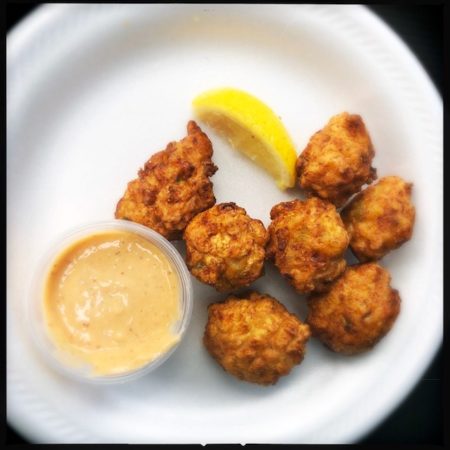 The corresponding drink menu is predominantly fruity, focusing mostly on mojitos ($9), mules ($7), and margaritas ($8). There’s also a wine list, plus bottles of Kalik ($5) and Red Stripe ($4) beer, among others.
The corresponding drink menu is predominantly fruity, focusing mostly on mojitos ($9), mules ($7), and margaritas ($8). There’s also a wine list, plus bottles of Kalik ($5) and Red Stripe ($4) beer, among others.
The menu includes several sandwiches, such as the El Cubano ($13) made with sliced pork tenderloin, honey ham, and Swiss cheese. The Mojo ($18) is basically a cheesesteak, with the thinly sliced ribeye replaced with a scattering of tenderloin chunks. Served on a huge, super soft hoagie, the meat is topped with grilled onions, sautéed tomatoes, and fresh lettuce. The description mentions chipotles, but the part was played by a bounty of sliced red and green bell peppers, the flavor of which dominated each bite. Although accompanied by some outstanding hand-cut fries, The Mojo lacks mojo.
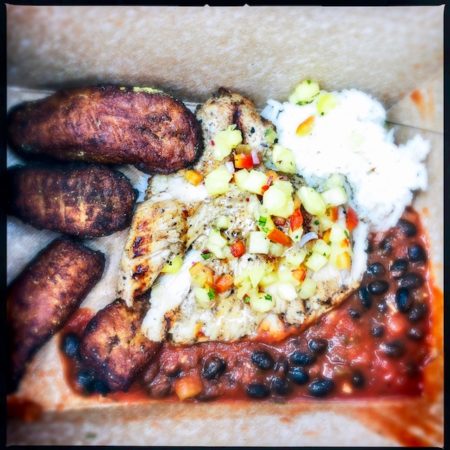 My misaligned expectations likely stem from optimism that ‘mojo’ meant the tart, garlicky marinade and dipping sauce ubiquitous in Puerto Rico and Cuba. Although Chef Juan Hernandez hails from Puerto Rico, there’s nary a mofongo or tostone — not to mention a single empanada — on the menu.
My misaligned expectations likely stem from optimism that ‘mojo’ meant the tart, garlicky marinade and dipping sauce ubiquitous in Puerto Rico and Cuba. Although Chef Juan Hernandez hails from Puerto Rico, there’s nary a mofongo or tostone — not to mention a single empanada — on the menu.
There is, however, a flavorful Bajan curry ($18). Served on white rice, six plump shellfish arrive nestled in a mild coconut milk and yellow curry powder-based broth. Redolent with coriander, cumin, and turmeric flavors, there’s once again an oversupply of bitter bell peppers dominating the otherwise balanced dish.
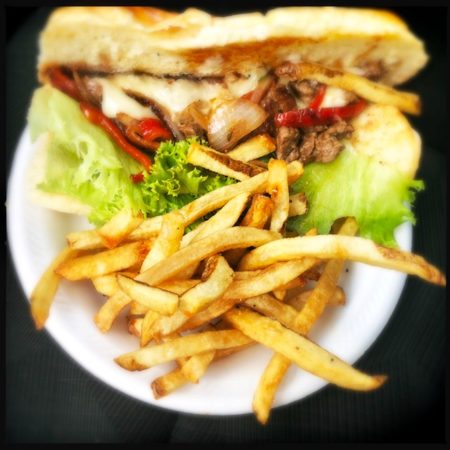 The peppers mind their manners, however, as part of a pineapple-based garnish on the jerk platter ($15). The fresh, fruity salsa is served atop a thin, grilled chicken breast. Although perfectly cooked, the tender meat lacks any of the Scotch bonnet heat anticipated with the Jamaican classic. Accompanied by soggy white rice, plus firm black beans in a thin red sauce, the highlight of the plate — if not the menu — are the four slices of fried ripe plantains ($3 as a side). The starchy fruit has a sweet, caramelized outer layer, which gives way to the tender, tart flesh inside. It’s a must-order taste of the tropics, and a hint a
The peppers mind their manners, however, as part of a pineapple-based garnish on the jerk platter ($15). The fresh, fruity salsa is served atop a thin, grilled chicken breast. Although perfectly cooked, the tender meat lacks any of the Scotch bonnet heat anticipated with the Jamaican classic. Accompanied by soggy white rice, plus firm black beans in a thin red sauce, the highlight of the plate — if not the menu — are the four slices of fried ripe plantains ($3 as a side). The starchy fruit has a sweet, caramelized outer layer, which gives way to the tender, tart flesh inside. It’s a must-order taste of the tropics, and a hint a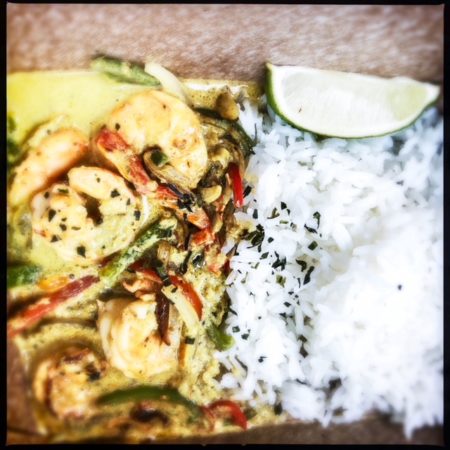 t what could be.
t what could be.
Considering the welcoming, stylish space; enchanting outdoor terrace; and friendly, earnest service from the winsome staff, JuJu has a lot going for it. Still, the largely generic menu seems to be trying to please the masses, which feels like a lost opportunity. With any luck, the chef’s roots will eventually prevail, supplanting hackneyed dishes like street corn ($4) and shrimp tacos ($9) with authentic Puerto Rican, Cuban, and other Caribbean fare.

